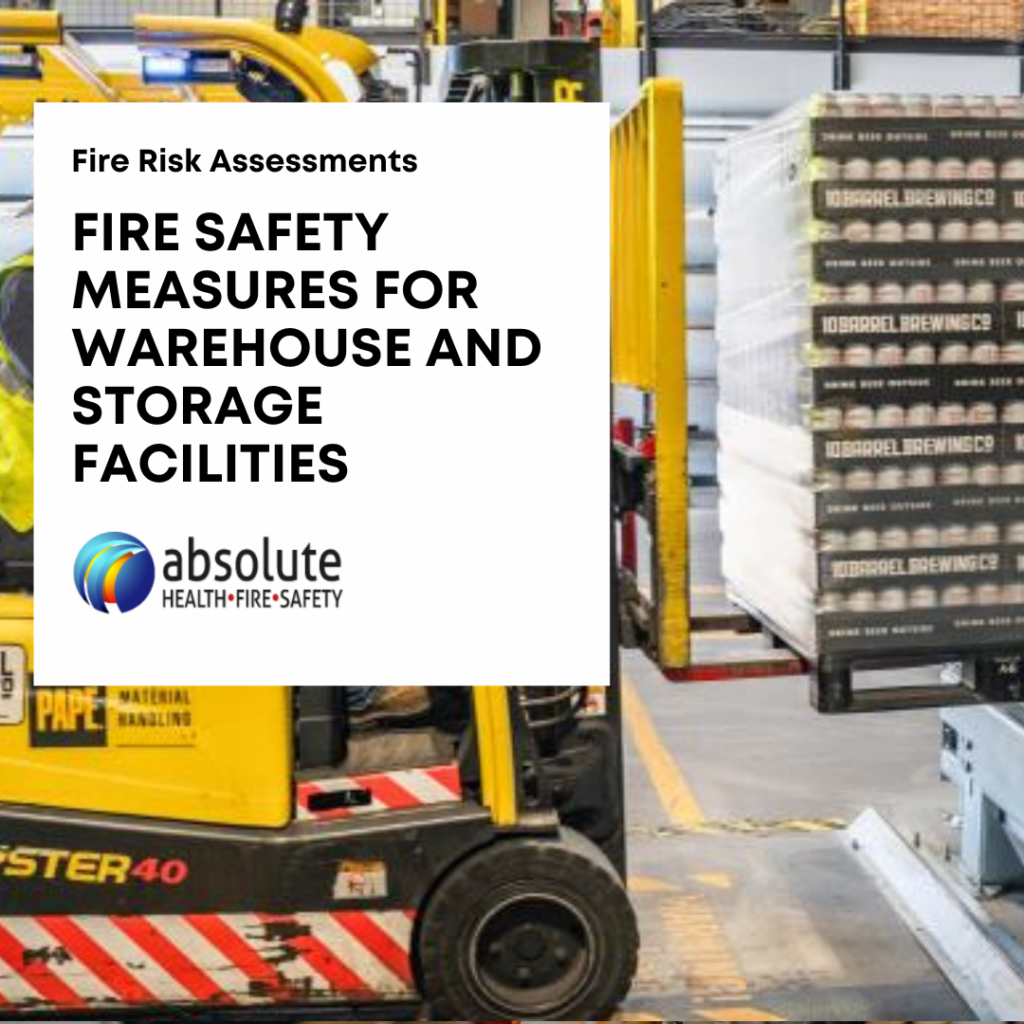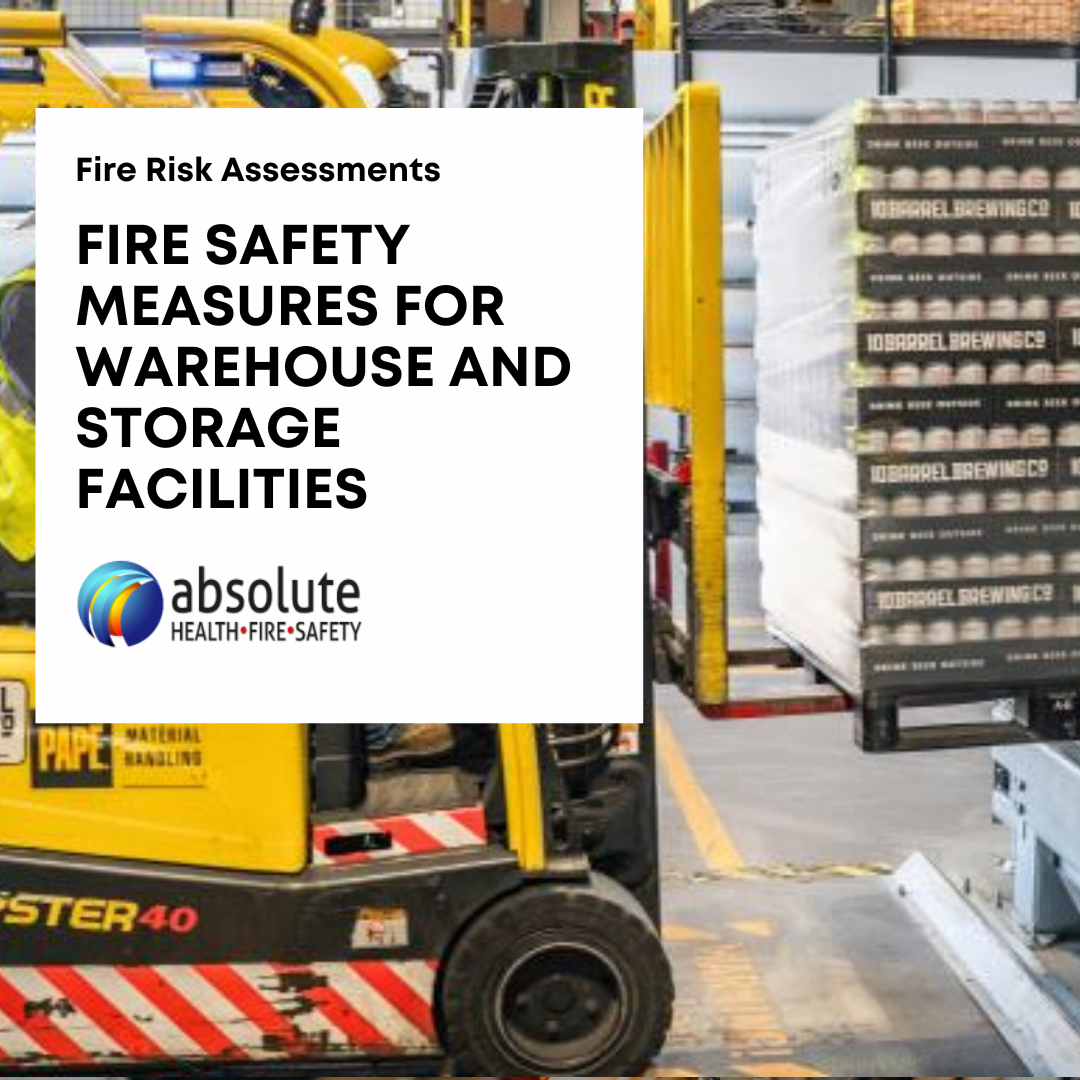Fire safety and protection should be a concern for all industries and sectors, though you may consider warehousing and storage facility spaces to contain more obvious risks and hazards.
Given the large volumes of goods stored in confined spaces, heavy machinery used, flammable liquids and a multitude of appliances used for long periods, we’d also agree it’s safe to assume the dangers.
Implementing effective fire safety measures can prevent devastating losses, ensuring not only the safety of workers but also the protection of valuable assets.
In this blog, we will explore some of the most prominent fire safety measures that warehouse and storage facility managers should prioritise.
We will cover the following in greater detail:
- Fire risk assessments
- Fire detection systems
- Fire suppression systems
- Fire compartmentalisation
- Safe storage practices
- Emergency evacuation plans
- Employee training
- Maintenance and expectations
Get you without-charge quotation for fire risk assessments in Yorkshire by calling 0113 418 2911 or use our contact form.

1. Fire Risk Assessments
A thorough fire risk assessment is the foundation of any fire safety strategy. This involves identifying potential fire risks and hazards, evaluating the risk of fire starting and spreading, and determining how fire could impact the facility. You are obligated by law to have a fire risk assessment conducted and renewed on a regular basis. The risk assessment should include:
- Inspections of all combustible/flammable materials stored in the warehouse.
- Evaluation of heating, lighting, and electrical systems that could be fire hazards.
- Review of fire prevention measures currently in place.
- Analysis of fire detection and suppression systems.
A fire risk assessment must be conducted regularly to ensure it remains relevant, especially when there are changes to the building structure, inventory, or operational processes. This assessment allows management to make informed decisions on the required fire safety measures and helps in developing a comprehensive fire safety plan.
2. Fire Detection Systems
Early detection of fire is crucial in preventing small ones from growing into larger, uncontrollable blazes. Warehouses should install automatic fire detection systems such as smoke detectors, heat detectors, and flame detectors to alert staff to potential fire incidents.
- Smoke Detectors: Ideal for warehouses storing materials like paper or fabric, smoke detectors provide an early warning by detecting the presence of smoke.
- Heat Detectors: These detectors respond to increases in temperature, making them suitable for areas with high dust or dirt levels where traditional smoke detectors might fail.
- Flame Detectors: These are more specialised but can be beneficial in high-risk areas, detecting fire by sensing infrared or ultraviolet light emitted by flames.
In larger facilities, fire detection systems should be connected to a centralised alarm system that alerts all personnel and automatically notifies local fire services. We can advise more specifically for your warehouse or storage facility should you need us to. There are lots of different products on the market so we understand this can be overwhelming at times.
3. Fire Suppression Systems
Once a fire is detected, the next critical step is to contain or extinguish it before it spreads. Fire suppression systems are designed to control or heavily get rid of fires without human intervention. The most common systems in warehouses include:
- Sprinkler Systems: Automatic fire sprinklers are essential in warehouses and storage facilities as they provide continuous water flow to control the spread of fire. In areas storing flammable liquids, foam-based sprinkler systems are recommended.
- Gas Suppression Systems: For facilities with sensitive electronic equipment or where water-based suppression might cause damage, gas suppression systems (using inert gases or chemical agents) are more suitable.
- Portable Fire Extinguishers: Placing portable fire extinguishers in easily accessible areas throughout the facility ensures that small fires can be managed quickly before they escalate.
- Fire Doors: These are legal obligations but making sure they’re suitable and fit-for-purpose in your warehouse is required.
4. Fire Compartmentalisation
Fire compartmentalisation involves dividing a warehouse into sections or zones with fire-resistant barriers to prevent the fast spreading of fire. Firewalls, fire doors, and fire-rated ceilings are all part of compartmentalisation strategies. These barriers can help contain a fire to a specific area, limiting damage and providing important extra time for evacuation and fire fighters to arrive on the scene.
- Fire Doors: As previously mentioned, fire doors are essential in preventing the spread of fire between different sections of a warehouse. These doors must be kept closed when not in use and should be equipped with automatic closing mechanisms in the event of a fire. Certain grades and standards are available on the market so look into this or ask our team to advise.
- Fire-Rated Materials: The use of fire-rated materials for construction can also help contain fires. For example, fire-resistant insulation in walls and ceilings can prevent the spread of heat and flames.
Fire compartmentalisation is very clever and can be the difference between averting disasters relating to fire. Make sure your warehouse or storage facility is up to scratch today!

5. Safe Storage Practices
Proper storage of materials in a warehouse can significantly reduce the risk of fire. Ensuring that combustible materials are stored safely and away from potential ignition sources is a simple yet effective fire prevention measure. Sounds simple really, but it can make a big difference.
- Separation of Incompatible Materials: Flammable liquids, chemicals, and other hazardous materials should be stored separately and in specially designed areas.
- Adequate Spacing: Avoid overcrowding shelves and storage areas. Proper spacing allows for air circulation, which can prevent overheating and make fire suppression easier.
- Use of Fire-Resistant Containers: Store hazardous or flammable materials in fire-resistant containers to minimise the risk of ignition.
6. Emergency Evacuation Plan
In the event of a fire, you need to make sure you know what to do. Rehearsing evacuations is common practice and are designed to ensure everyone can get out quickly and safely if the real thing were to happen. Make sure your warehouse and storage facility have:
- Designated evacuation routes that are clearly marked and free of obstructions.
- Emergency exits that are easy to access and equipped with panic hardware for quick opening.
- Assembly points located a safe distance from the warehouse.
Proper training and regular drills will make people feel more confident and comfortable with procedure, in preparation for an actual fire.
7. Fire Safety Training
Employee training is vital for fire safety in any facility.
- Fire prevention practices: All staff should be trained and informed in this way. Keeping flammable materials away from heat sources, maintaining cleanliness to prevent dust buildup, and using equipment safely should all be common practices.
- Use of fire extinguishers: Employees should know how to use different types of fire extinguishers and when to use them.
- Evacuation procedures: Regular fire drills should be held to ensure everyone is familiar with evacuation routes and protocols.
8. Maintenance and Inspections
Regular maintenance and inspections of fire safety equipment, electrical systems, and heating systems are essential in preventing fires. Faulty wiring or malfunctioning equipment are common causes of fires in warehouses, and timely inspections can identify these hazards before they become problematic. In potentially dangerous spots like warehouses, we would suggest general inspections and maintenance work should be done anyway. Hiring a professional team to do this for you routinely would also be a great idea. If you’d like a quotation on this, we’d be happy to look at it here at Absolute Health Fire Safety.
Call Absolute Health Fire Safety Today

We truly hope you have found something useful from this blog about the top fire safety measures for warehouse and storage facilities. It’s a subject that we are truly adept in here at Absolute Health Fire Safety, having helped hundreds of clients to safeguard their industrial premises from fire.
Simply pick up the phone and give us a call on our dedicated line which is 0113 418 2911 or use the contact form. We monitor both these options predominantly from 9am and 5pm every week day so we will always get to you as soon as we can. In any case, we look forward to hearing from you and dealing with your warehousing and storage facility enquiries shortly!

